Greetings! ScoreKeeper here hunting hungry readers for my latest interview with one of Hollywood's most prodigious composers of film music.
John Debney has had a benchmark year. Known more for light family fare, Debney has barnstormed his way through some of Hollywood's bigger blockbusters forging the notes and bolts of their gut-walloping scores. He's already a prolific film composer; however, 2010 is avalanching into one of the busiest of his career. Debney has flexed his blacksmithing chops with IRON MAN 2 (2010), stalked the dangerous jungles of the universe in PREDATORS (2010), opened a can of gringo whoop-ass with MACHETE (2010) and let's not forget the lovely and delicate VALENTINE'S DAY (2010) nestled innocently amongst this burly trio.
During my time writing for Ain't It Cool News, I've interviewed over thirty film composers. John Debney was the first composer I interviewed a third time and he now marks the first composer whom I've interviewed a fourth time. He remains one of the most open, honest, friendly, and enlightening composers I've had the pleasure of speaking with. In an industry ripe with canned answers and subscription based opinions, Debney tells it like it is and isn't afraid to express his thoughts, opinions, or feelings about a particular topic with refreshing candor. This may be one of my favorite interviews to date. I made efforts to avoid the usual stock questions and attempted to dig a little deeper than one might ordinarily venture. John rewarded me with some truly alluring insights into the world of film music that both the casual listener and die-hard enthusiast can equally enjoy.
Happy reading!

ScoreKeeper: Thanks for taking the time out to speak with me today. I've actually wanted to chat with you for several months. You've had an incredibly busy year with little downtime in between projects. Is 2010 the biggest year of your career?
JD: You know, some might say that. I have been very lucky. It’s been a great run. Honestly, it’s been nice to do some different kinds of projects, not just the normal family fare that I’ve been known for. Yeah, I’m very excited and happy with what we have done.
SK: It's nice to see you out there flexing your "action-score" muscles a little bit more.
JD: Yeah. You know how it is. You know our business. It can be difficult. You have to make a conscious effort, if at all possible, to steer it certain ways. What can I say? It’s been fun doing some different things.
SK: I want to touch a little bit on all of the major films that you have been working on this year. Let's start off with your most recent film, PREDATORS. What a nasty score!
JD: Thanks! That’s what I wanted.
SK: This sounds like it was a very daunting project. What was the biggest compositional challenge you faced?
JD: Thanks for asking me about it. I would say the first biggest conscious decision was, do I embrace a score that I love, that we all know and love - and that's Alan's (Silvestri) score for PREDATOR (1987) - or do I completely ignore it and try to create something new?
At the end of the day after thinking about it and talking about it with the filmmakers, to me it made more sense that I utilize some of Alan’s great score and embrace that whole thing. That was big decision number one. Once everybody was on board with that it was a wonderful case of tearing it apart and understanding what he did then create my own extrapolation from that.
SK: Was that solely your decision?
JD: No, it was a group decision.
SK: Did you have to do any convincing?
JD: No, honestly I didn’t. It was sort of left to me which was really wonderful. Robert Rodriguez and Nimrod Antal…they love that first score, as we all do, and they put in little bits and pieces of it when they temped the film. I just fell in love with the idea. In talking with the folks at Fox, they basically said, "It's your decision what you want to do." They said they would be really happy if there were some of the original score in there. They were very open about it and gave me a lot of creative freedom.
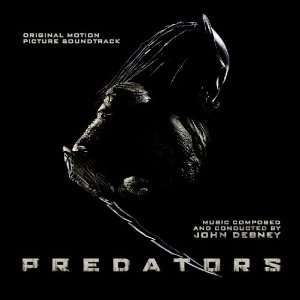
SK: There are some obvious moments where even the casual moviegoer will hear Silvestri's original theme and recognize it, but it’s actually woven a bit more intricately within the fabric of the music itself. Can you shed some light on the more nuanced moments where you worked Silvestri's material into your music?
JD: Sure. One of my biggest goals was to make the whole thing organic. I didn't want it to be a patchwork sort of thing. I received an email recently from somebody saying they had listened to PREDATOR and then went right into PREDATORS. They were quite pleased by the fact that it sounded like it was all one score. Ultimately, that was my goal...to pay homage to what I think is one of the best scores that Alan has done.
You are definitely right. There are a lot more subtle moments where I might use a couple of notes or a fragment or two of one of his ancillary themes and would expand upon it.
SK: This question comes up a lot in modern cinema, “Do we use the theme from the previous film or not?” A lot of times I am disappointed because they just stick it in wherever it's most convenient. It doesn't feel like it's part of the score at all.
JD: Listen, I’m a fan of film music too and I am quite amazed how often this happens. If you talk with ten other composers they would probably say the same thing. THE A-TEAM (2010) comes to mind for instance. I'm not sure they used a lot of Mike Post's iconic theme in that movie. I bet if you were talking to Alan there might be a quandary in terms of, "Why not?"
I'm with you. I sometimes think that when Hollywood does these remakes, they do these remakes because of some market research and they forget and lose sight of the gems that are involved with it...like a classic theme. It's a little odd to me too. I don’t really have an answer for you, although that does seem to be what happens.
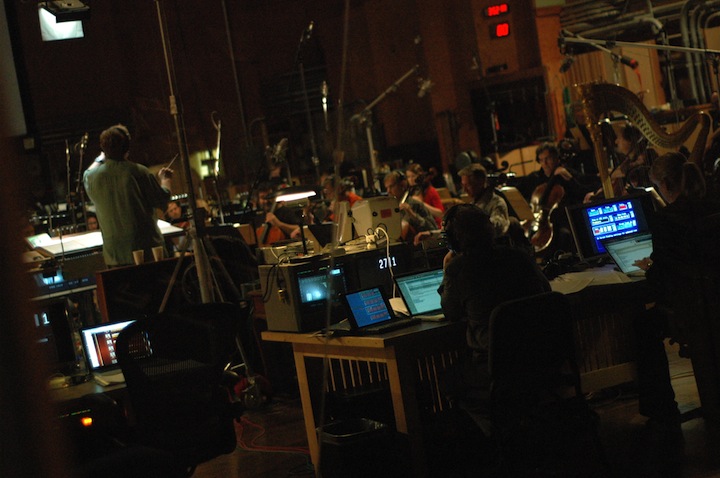
Pete Anthony conducts John Debney's score for PREDATORS
(click to see more photos at ScoringSessions.com)
SK: It shouldn't be reduced to simply stating the theme. Build with it. Take the same building blocks used to construct the original theme and use them to build your score. Use the intervals, rhythms, harmonic progressions, instrumentation, whatever makes the theme iconic. I don't think the argument is that simple, "Do you use a theme or not?" If you decide, "Yes!" then embrace it. Dive into it and really tear it apart. Deconstruct it and then reconstruct it. I think that's why the PREDATORS score works so well.
JD: Thanks. That was my intention. It wasn't to just play it note for note - although we did do that in a couple of spots and I think they're fun moments for fans of these movies - but it was really to do it justice.
I think there’s an added element of ego sometimes. I could have approached this a different way. I could've created my own new theme and that's valid too, but I just decided to go this way because it felt right to me. Somebody asked me, “If there is a sequel to this movie, would you use Alan’s theme again?” I would have to see the movie. Maybe yes. Maybe no. We are all artists and sometimes artists want to create their own new version of things. I think that's cool too, I really do.
SK: How did you start this score? Were you working immediately with the previous material or was it easier to dive into something original?
JD: I took a few days and studied the score. I listened to Alan's original score. Then the very first cue in the movie popped up. I scored the film in order as it were, and the very first cue in the movie has a little of Alan's material right toward the end of this long piece. The whole beginning of the movie is me in this style. That was fun. I just wanted to dive in and write something that was utilizing similar scales and motifs and harmonic progressions. That's what I did. From there it became rather organic where and when I wanted to quote some of Alan's material. It was left up to me.
There were some key sequences where we all, the filmmakers and I, agreed that it would be really cool to pull in Alan’s music note for note. That’s what I did in a couple of spots.
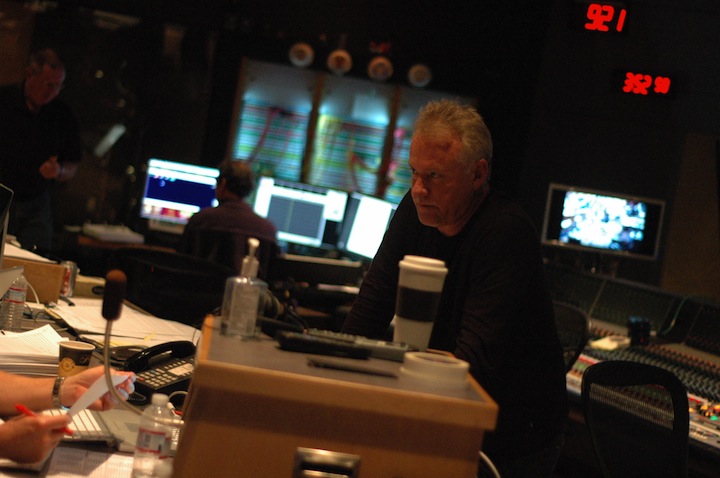
John Debney listens to a cue
(click to see more photos at ScoringSessions.com)
SK: Another aspect of this score that I'm very attracted to is that it's not all pure action. So many action scores are wholly focused on kinetic energy. You actually spend an inordinate amount of time building up potential energy to seemingly uncontainable levels until it sonically explodes on screen. It's very much like a hunter stalking its prey and then...BAM!...you get the attack. What's more difficult to control compositionally? Is it the kinetic energy or building up the potential?
JD: That’s a great question. I think it’s building it up. There’s a lot of stalking around the jungle and the audience doesn’t really know a lot of what’s happening for the first couple of reels. It was the buildup that I think was the more difficult of the two because there was a lot of soundscape design and we worked hand in hand to create these ambient, uncomfortable, edgy sorts of music/sound-design areas.
I would say it’s in the buildup that was the most difficult for me to do. The way I handled it was by giving the filmmakers a whole lot of choices. They had a lot of control. They could bring certain elements in and out and therefore work better with the sound design.
There's a cue called "Hound Attack" in particular that was a lot of fun to write because it was one of the more aggressive cues I've written in a long time. We utilized a lot of interesting sounds and metallic scrapes and screaming pigs and all kinds of stuff in that particular cue and so by the time that cue hits you, it’s pretty jarring. I would say that once we get into the meat of the action, it was a little more familiar territory for me, but it was the building up that was most interesting and fun for me, because I didn’t want to just throw in an ambient pad.
We have all of these wonderful patches now, as you well know. You put your hand on a key and it does these amazing things that we can live with for minutes at a time. I wanted to recreate that but I also wanted to create some custom sounds. That's what we did. That's why I think the ambient portion of the score is, for me, the most satisfying because it was a lot of fun creating that stuff.
SK: It sounds like a real composers' playground.
JD: It was.
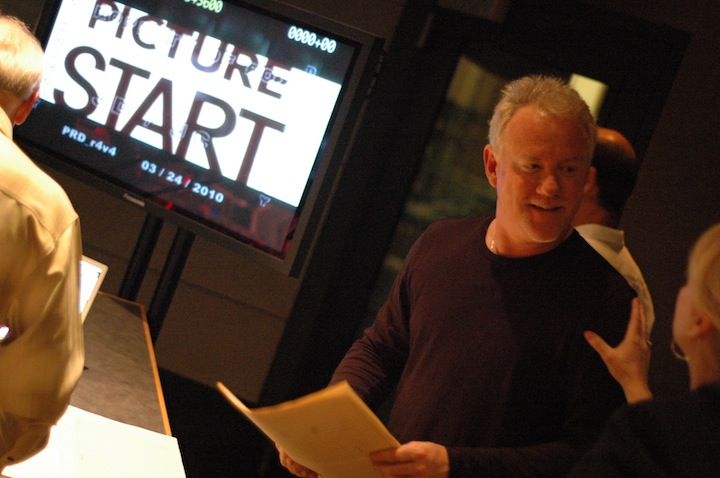
John taking a quick break from the PREDATORS recording session
(click to see more photos at ScoringSessions.com)
SK: Have you heard from Alan since you did your score? Have you talked shop with him regarding PREDATORS?
JD: You know, I haven’t. What I did early on when I started working on this thing, I just gave him a quick email. I wanted to let him know from me just how much I love his score and that my intention was to write the score with him. That’s the way I put it. I said “I know this sounds crazy, but in my mind I’m writing it with you, because you created this sound and I’m going to have some fun and splash some other colors on it.” That’s sort of the way I put it. I simply emailed him and I have not heard from him, nor did I expect to, nor does he need to contact me, but I hope one day when hears it, he might smile. I’m sure at some point I will bump into him and hopefully he liked it.
SK: I’m trying to think off the top of my head here...have you ever experienced what Alan experienced. Has anybody taken your music and then built a sequel score from your previous material?
JD: Not to my knowledge. Although I will say I have been doing this enough that strangely some of the things that I did eight, nine, or ten years ago, the studios are starting to remake some of these crazy films.
My friend Chris Lennertz just did CATS AND DOGS 2 (2010), which I have not heard. I got a lovely little email from him. It was sort of like I did with Alan where he was saying “I want you to know that I love the first score and I did my version of it and man you rocked it and I hope you like this one.” I thought that was very sweet of him. I wish that we had more of that in our ranks of “composer land.” We don’t seem to have a lot of that these days and so when it does happen, I think it’s a wonderful thing.
SK: I’m sure you put yourself in Alan’s shoes and try to empathize with his experience. It’s got to be weird to have somebody independently write a score based on your music.
JD: It is. I’ll tell you honestly...It was my first thought when they approached me on PREDATORS...the first thought you have is, “Why the hell didn’t you hire Alan?” Then you realize, “Well, there a lot of factors...Is Alan even available? Was he not available? Was the budget such that he wasn’t interested? Did they ask him?” All of those thoughts go through your mind. Same thing I’m sure on CATS AND DOGS. I didn’t ever get a call, nor did I care to. I had already been there and done that.
I think sometimes it’s true with filmmakers too. I've found there are two kinds of filmmakers out there. There are the ones that once you establish a relationship with them and you have had some success, they come back time after time. That’s a wonderful thing. That’s a best-case scenario. There are other kinds of filmmakers that want to try on a new hat and there’s sometimes no malice in that, you are still friends but they just want to try something different and that doesn’t mean they won't come back to you.
So in the case of PREDATOR and then something I have done like CATS AND DOGS, it’s not that necessarily you are not wanted on any of those, it’s just new filmmakers with new ideas who want to try on a different hat.
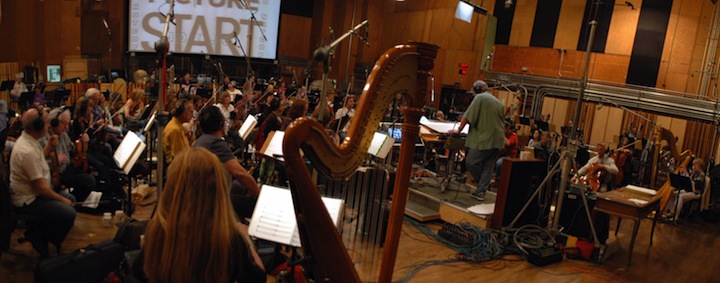
Pete Anthony gets ready to conduct the next cue
(click to see more photos at ScoringSessions.com)
SK: Your relationship with Robert (Rodriguez) definitely made you a natural pick for this project.
JD: Well that’s exactly right. That was probably the number one reason why that happened. Robert and I have a unique relationship. Over the years we have done five films together, I think. Robert is a very loyal "salt of the earth" guy and he and I have been through a lot of battles together. One of the things that I admire so much about Robert is he's a real man of his word and if he says something, I'd take it to the bank.
I like to hang out with him too. When he's in town here in LA we always try to go to lunch. I think it's a pretty unique relationship and one that I value a lot.
SK: Speaking of good relationships, earlier this year you worked with John Favreau on IRON MAN 2 (2010). I've talked with you enough over the years that I feel like I can be open and honest with you. I think your score for IRON MAN 2 is a solid score, but I have to admit that there were aspects of it that fell short with me. I was hoping I could touch on a few of these critiques if you will allow me.
JD: Sure, you can go right ahead.
SK: One of the things I admire about your work is you're a very organic composer. Your scores are very fluid and have this sort of purposeful inevitability about them. Your score for IRON MAN 2 lacked these characteristics. It sounded like it was coming straight from the first film, which I think is the right direction to go, but I was expecting something wrought from the first score but exhibiting more of your organic fluidity. Instead, it had a very "on or off" quality to it.
Can you start off talking about the genesis of this score and how you developed your approach? Why does this score in particular exhibit these characteristics?
JD: Listen, I think that’s a good question. It’s a timely question too because in listening back to some of the earliest demos I did for that movie, I think they are quite good. I think what invariably happened with this movie is that it was such a big unyielding freight train. If you asked Favreau about this I’m sure he would say the same thing.
We had very little face time, Jon and I. We had very little time to sit together which, by the way, was unlike our other collaborations. He confessed to me that he wished we had more time together. What that score became in my humble opinion - and I can be as self-critical as anybody - is that it became a little bit watered down from what I originally wanted. In other words, I had written what I thought were some pretty big aggressive themes for that film. The areas where I wanted to state those themes, I was precluded from doing so. The filmmakers know better than I and because Iron Man and Tony Stark in particular are such complex characters, I think what Jon felt was, if the themes with Tony or Iron Man got too broad or too heroic, it turned him off.
SK: I can understand that.
JD: Yeah, I can understand it too. It was a lot of hard work, but also a perplexing journey and a little unfulfilling for myself too. This is the first time I've been asked this question and I'm kind of glad you did. There are things that if I had to do over, I would do differently. One thing I did not want to do was to write a "cookie-cutter" score. I don't know if I accomplished that or not.
When I initially got hired to do this, I told Jon I thought it would be fun to write a "Led Zeppelin with an orchestra" score and he said, "That would be cool!" So that was the initial intention. Over time it changed. It morphed into other things. Every note was scrutinized, in my opinion, which wasn't necessarily a wonderful thing. I think in doing that, the overall concept of the score got watered down and mashed up a little bit. If that's what you're referring to, I would agree with you. It was the nature of the beast.
One of the good things was it enabled me to explore a lot with one of my favorite guitar players, which is Tom Morello. There were a lot of things that Tom and I did that never got on the score that I think are some of the best things we did together.
It is what it is. It was fun but it was a different score for me. I’m left with a feeling like I just ate a great meal and then twenty minutes later I'm still hungry. I think had it been a different kind of movie, I might have been able to go more toward those places that I wanted to go. Having said that if there’s an IRON MAN 3 and if I’m lucky enough to be involved maybe I will be able to do that.
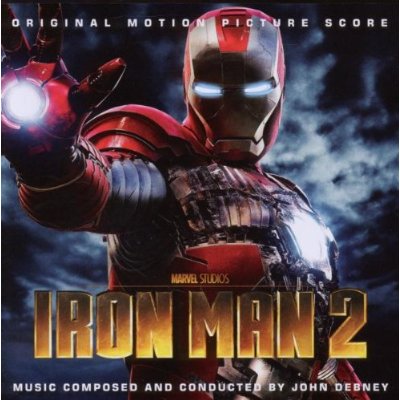
SK: You also touched on another point of contention I had with this score. You composed a great theme for IRON MAN 2, a very heroic theme. I agree you can't use that one theme for the whole film. Tony Stark is a much more complex character than a single heroic theme can wholly express. I'm a lover of melody and you're a melodic writer. I think IRON MAN 2 would have been an excellent opportunity to bring out Stark's character complexities with more well developed themes. The one theme you did write was quite good but it's barely in the film.
JD: Very little went in the can. Favreau is a genius and I've learned a lot from him. He's really sharp and I think it was just the nature of the beast. The very last thing I threw on the soundtrack is a piece called "I Am Iron Man" and that is a portion of what I hoped was going to become "Iron Man's" theme. There weren't a lot of places in the movies where we could play it.
When we put on the suit we’d hear strings but that’s not the theme. We recorded like five different versions of the "putting on the suit" music with different portions of the theme fleshed out or left out. The one we ended up going with was less thematic. It was sort of a groove with a little bit of French horn. Maybe that was the right choice, but it was a difficult decision. It was difficult to find the areas in the movie where we could let Tony be a superhero.
There were moments where I wanted to play a scene broadly or make a love scene out of it but we were never able to go there. At the end of the movie when Tony finally kisses Pepper, for heaven’s sake, there were a couple of versions I did that were really gorgeous and lush but it just didn't fit. It's a different kind of movie because they kiss and then all of a sudden the mood is broken. It's just the nature of this character. I hope that answers your question as to the "why" of the score. I had the same feelings about it myself.
SK: I’m very impressed with the way you handled all the orchestral elements, electronic elements and rock band elements contained in this score. That's not easy to work into one score. When it comes to Mickey Rourke's character, Whiplash, all of that music you wrote for him is absolutely fantastic and the way you incorporate that...
JD: Thank you. Can I comment on that?
SK: Of course.
JD: First of all, that was what I was just about to say. You kind of just read my mind. The joy for me of that film and what I did think worked musically was Mickey’s part. When Jon gave me the opportunity to write that really long piece of music in the beginning of the film, it was really satisfying at the end of the day. What Jon did so beautifully was he let us learn who Mickey Rourke was. He gave me a great opportunity to get into that scene and learn Mickey's circumstances and to play sincerely sad music for him and the relationship he had with his father. John gave me the opportunity to morph that and turn it into something really dark and twisted.
For me that was the most satisfactory part of the score and the film, to be able to really explore Mickey. That was awesome! So I would say thank you for that and I agree with you. That was the most fun aspect of the score for me.
SK: When you are trying to handle orchestral, electronic, and rock band elements, where do you begin? What comes first? How do build the layers?
JD: You experiment. I probably did five to ten versions of every piece of music in that film and those are all in the demo realm. When I did have time with Jon he would say, “Yay” or “Nay,” or what he liked or what he didn’t. I think we got the tone right in a number of spots in that movie but it was a struggle. I think ultimately even now it was a struggle and I'm not saying that lightly.
I thought Jon felt sometimes, “We don’t necessarily want to do a rock and roll score.” The first one was more like that which was really well done. Ramin did a terrific job. I think Jon wanted to go a little more orchestral and a little more traditional. I would try to infuse it with the organic elements from the first score. One thing never really comes first. It’s more like one thing leads to another and you just sort of go from there. You just experiment and you try different things and at the end of the day you come to some kind of common consensus as to what a piece of music is going to be.
SK: My next question - and this could be off the record if need be - I just had to ask and get your thoughts. I'm generally not one to complain too much about how poorly music is mixed in films today because it's the status quo. I've come to expect it; however, IRON MAN 2 exhibited one of the more egregious mixes I've encountered in a long time. There were moments during the movie where my ear could not perceive any semblance of music even though there was indeed music present. Music is a magical ingredient in movies and it can do some wonderful things but if it's not picked up by the ears of the audience, it's useless. Was this a point of contention for you?
JD: You know what? It’s a frustrating thing. We could do it on the record or off. It's a good question and I'm glad you asked it. I agree with you. I thought the mix was not a music friendly mix at all. But I will say that the film is not necessarily a music friendly film. The film had such dense sound design.
SK: Yes it did but so do a lot movies with well-balanced mixes. It's understandable but not really a good excuse.
JD: It is understandable. You know what? Sure I'm disappointed but that's how a lot of movies are done. A lot of movies where it's just the nature of the beast. PREDATORS was not the most music friendly mix. There were a lot of times where I felt the music could be a little louder.
SK: I’m constantly amazed and confused. If music can't be perceived at all, even on a subconscious level...if it's failing to compete with what little sonic real estate it requires to function, then why is it even there? What is its function?
JD: You are very astute. The problem is when it is too low like that, it feels like a mistake. So many times I will opt or suggest they take it out because it doesn't do anybody any good to have a piece of music that is barely audible and you think, "Well, what is that?"
I think sometimes modern filmmakers are a little bit weary about pushing the music up. There’s sort of an attitude where, “you are leading the audience.” I hear that sometimes. You know, Jerry Goldsmith had a great quote when somebody said that to him. Somebody suggested to Jerry once, "Well Jerry, you know you may be leading the audience," and Jerry said, "Of course! That's what we do. That's what music is supposed to do!"
Who am I to ever argue with the master?
SK: That is interesting. We could talk all day about this I think. It’s definitely one of the hotter topics amongst the scoring industry. Let me switch gears yet again. You are working on MACHETE right now, is that correct?
JD: I am. We are just now finishing it up.
SK: What can you tell us about that? Where are you in the process? What can we expect?
JD: It’s my buddy Robert. He invited me back to the party. It started out that maybe I was just going to work on a couple of things and as I got going, I ended up working on a lot of the score.
The score is a real combo plate. It's really Robert, his band, and myself. I guess from what Robert tells me, I'm part of the band now, which is really awesome! It's going to be a really fun score. It's a blend of Latin rock 'n roll with a Tex-Mex attitude and a lot of big synth orchestral and other synth textures.
It’s just this fun home-grown, loud, lots of guitars and drums kind of a score. I had a ball!
SK: Are you actually performing on it?
JD: Yeah, I’m playing a little guitar and doing a lot of synth work. Like I tell Robert, "I just threw a little spice on it."
SK: Last year I attended your recording session at Sony for A THOUSAND WORDS (2010) starring Eddie Murphy. I was there when you recorded the finale which was a phenomenal piece of music. I remember being really affected by the emotional content and the drama behind the music. I didn't even really know what was going on in the film. It was just so beautiful. It might be one of the most emotionally dramatic pieces of music I've heard from you.
Unfortunately, I haven't heard a word about this movie since. What's the story? Is it ever going to come out?
JD: I don’t know. It’s extremely disappointing that it hasn’t come out yet because I actually feel the film is quite good. It's a heavier weighted film. It's not your typical Eddie Murphy type fare. Eddie is so brilliant at playing lead characters in comedies, but this is different. I think it's a deeply nuanced performance and I think the message behind the film is utterly spectacular and important for our world today. It’s a message about love and redemption.
I don’t know what’s going on with the film, I really don’t. I heard talk that it might come out this fall. I guess it’s another one of those situations where things get put on shelves for various reasons. Maybe it’s because Eddie has done a couple of movies that maybe didn’t perform as well as people had hoped, but I don’t know.
I think it’s one of the best scores I have written in a long time.
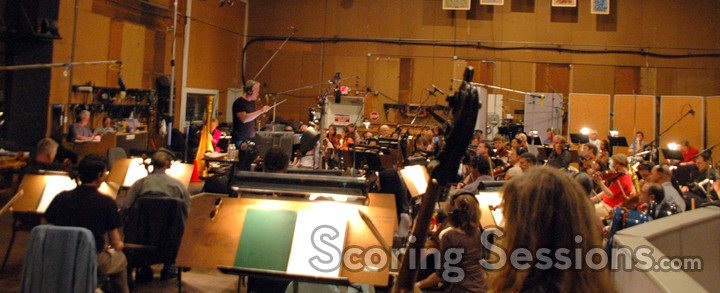
John Debney conducts the Hollywood Studio Symphony
(click to see more photos at ScoringSessions.com)
SK: A CD would be released upon the release of the film?
JD: Yeah. I have to talked about a CD with Bob Townson (at Varese Sarabande) and others. I think a CD will come out but until we know when there's a release date for the film, it's going to be pretty tough.
SK: I can’t wait to hear that last piece again. It was so emotional. I remember turning around seeing at least half the people in the booth tearing up. That probably doesn’t happen terribly often. I was impressed.
JD: It doesn’t happen very often but when it does it’s amazing. One of my greatest joys is being on the podium and conducting and writing this music. I was told that after the fact, interestingly enough, that there were a number of people with tears in their eyes. I love hearing that. That’s why we do what we do.
SK: It’s the ultimate compliment.
JD: Yeah. If you asked me, “What’s your favorite thing to do?” My favorite thing to do I think is to write terribly emotional and emotionally effecting music. Thanks again for mentioning A THOUSAND WORDS. It was incredibly fulfilling and cathartic to do that score. I wish Hollywood were making more of those movies. I think we can do one or two less superhero movies and one or two more movies like A THOUSAND WORDS. I think we would be in a better place as a community in Hollywood if we did more of that.
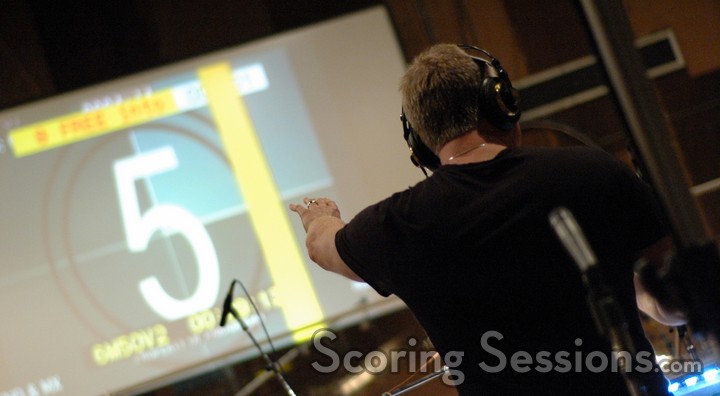
John Debney conducts A THOUSAND WORDS
(click to see more photos at ScoringSessions.com)
SK: One thing I wanted to talk to you about is the fact that you are probably the most socially networked composers in Hollywood. You are very active on both Facebook and Twitter. I love reading the little updates about you in the studio or your thoughts on seeing a film you're about to score. I think it's a great way to connect with your fans.
JD: Well listen, that’s great to hear. I want to share that with everybody in my office because we try. I don’t tweet as much as I should. We are trying to film every film scoring session now and we are trying to get a steady stream of material out there because I do think it’s important. I think it’s not only important for the fans of what I do but it’s important business-wise.
It’s really important for producers and directors to go, “Oh, look at that,” and then they hit a link and see two minutes of a scoring session. I think it’s extremely important and I’m delighted that you are mentioning it.
We have a lot of little ideas running around the office that we want to maybe do some day but I’m going to wait until we’ve got another major film release.
SK: I can tell you enjoy it. It seems very genuine. It doesn’t seem like an agent telling you “John, you really need to do this.” It seems like you really enjoy it.
JD: We are enjoying it a lot! I want to do enough but I also don't want to do too much. I wish I could share with the fans a lot more material but of course you have to be careful. The studio doesn’t want a lot of it out. I’m hoping that over time it’s going to be a little easier.
SK: I’ve got one final question for you for today. Can your Lakers take the Heat or will they have to get out of the kitchen?
JD: Oh hey, you know who you are talking to! The Lakers are going to beat them and it probably will be those two teams in the finals, but you know what? The Lakers have buffed up too. They’ve got my man Matt Barnes who I have always liked. They’ve got Steve Blake. They resigned Derek Fisher. They got the big shot blocker Theo Ratliff. Andrew Bynum is going to be healthy. Bring it on! Oh yeah…bring on the Heat!
SK: Oh come on, you've got to be at least slightly nervous about a certain threesome down in Miami?
JD: Nope. You know what? I would never bet against Kobe Bryant. That’s all I’m going to say. The Heat is going to be fun. I think they are going to be right-out-of-the-box amazing. It’s going to be fun to watch them but I’ll say this much...LeBron hasn’t won anything yet! What has he won?
I have learned you never bet against Kobe Bryant. That’s all I’m going to say.
SK: Spoken like a true Laker fan.

I'd like to thank John for taking time out of his busy schedule to talk with me. I'd also like to extend a hearty thanks to Dan Goldwasser at ScoringSessions.com for use of the photos, to Costa Communications for helping set up the interview, and a special thanks to Mike McCutchen for his transcription help.
Soundtracks for IRON MAN 2 and PREDATORS are currently available. I'll keep you posted on releases for MACHETE and A THOUSAND WORDS as they develop.
ScoreKeeper!!!



Pete Anthony conducts John Debney's score for PREDATORS (click to see more photos at ScoringSessions.com)

John Debney listens to a cue (click to see more photos at ScoringSessions.com)

John taking a quick break from the PREDATORS recording session (click to see more photos at ScoringSessions.com)

Pete Anthony gets ready to conduct the next cue (click to see more photos at ScoringSessions.com)


John Debney conducts the Hollywood Studio Symphony (click to see more photos at ScoringSessions.com)

